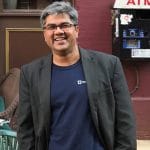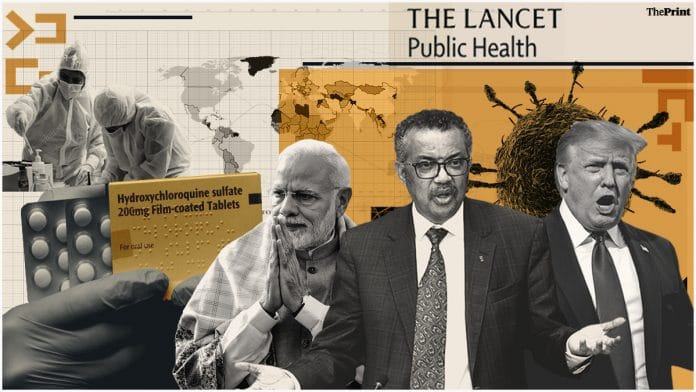Medical journal The Lancet has admitted that questions have been raised about the data published in its earlier paper on hydroxychloroquine drug. The study had linked HCQ to higher risk of death in Covid-19 patients, following which the WHO suspended allocating patients to HCQ arm for solidarity trial. An ICMR study had said that HCQ doses could reduce the chances of getting infected by Covid-19.
ThePrint asks: Lancet HCQ study row: Did WHO, experts rush to damn the drug due to Trump, Modi politics?
India depending on studies and drug approval from West shows it suffers colonial hangover
 Kiran Mazumdar-Shaw
Kiran Mazumdar-Shaw
Chairperson and MD, Biocon
From HCQ to remdesivir, I am skeptical about a number of repurposed drugs being either pushed or poo-pooed. Studies, like those carried by The Lancet, and clinical trials in general are extremely expensive and governments need to support them, given it is an emergency. All over the world, the Covid-19 conversation is slowly moving from concerns around the economy to strengthening homegrown scientific innovation.
I feel India is suffering from a colonial hangover. Take remdesivir, for instance. India’s drug controller approved its emergency use based on the green light given by the US’ Food and Drug Administration (FDA). Other such drugs are also being pushed by Big Pharma. India has failed to pursue credible clinical research on whether a certain drug is efficacious for curing Covid-19 or not. Meanwhile, we still are relying on information from the West and elsewhere.
Moreover, we are hesitant about our own research and need to foster a stronger scientific temper. Serum Institute of India is working on a BCG vaccine that seems promising, as it works to boost immune systems. Why not use BCG vaccines until we get a Covid-19 vaccine? Nobody seems to be asking this question, forget investing in it.
Biocon’s repurposed drug Alzumab has shown very good data in clinical trials but there is no sight of emergency use approval. Is this because the US FDA has not blessed it? Are we going to start doing autopsies of deceased Covid-19 patients or continue relying on data from Italy or the US? Given the number of Covid-19 patients, we ought to be doing more research.
HCQ is backed by lab data and decades of safety evaluation, other Covid studies are small and reported in a hurry
 Denis Xavier
Denis Xavier
Head, Division of Clinical Research, St. John’s Medical College
The reason hydroxychloroquine, or HCQ, became important in the fight against Covid-19 is because of the laboratory data on Covid-19 and safety evaluated over decades. Studies being done on Covid-19 now are small and reported in a hurry.
The recently published Lancet paper was an observational study. Despite the sophisticated statistical analysis, it is not enough to make a clean judgement for treatment of Covid-19. The results of the study clearly state that HCQ can lead to increased mortality and rise in dangerous adverse effects such as cardiac arrhythmia. The study is being questioned now.
This begs the question: did WHO act too quickly to stop the HCQ arm of the ongoing solidarity trial?
No. The WHO has temporarily stopped the HCQ arm in the trial, which is just one out of five arms. The data and safety monitoring committee at the WHO is carefully verifying the data available in the study so far. Meanwhile, The Lancet and others are further investigating the study, and The Lancet has already published an expression of concern.
I think the WHO will soon take the bold step of resuming the HCQ trial arm because it’s a cheap and widely used drug all over the world, particularly in low-income countries.
We should also not lose sight of the emerging data from India on HCQ for prophylaxis, which is encouraging.
Desperation for evidence-backed medicines to cure Covid leaves room for malpractice
 Oommen C. Kurian
Oommen C. Kurian
Senior Fellow & Head of Health Initiative, ORF
Many experts raised concern in the past about ICMR recommending HCQ as prophylaxis for asymptomatic Covid-19 health workers and household contacts of confirmed patients, due to lack of compelling evidence. Despite this, several states have been using HCQ as a prophylaxis as well as for treatment, partially because of a lack of affordable and effective alternatives. There was also a need to prevent panic on the frontline.
However, when the Lancet study suggested there was no evidence of benefits from HCQ, and that the drug instead increased the risk of abnormal heartbeats and a greater hazard for in-hospital deaths in Covid-19 patients, there was fresh public outcry against the ICMR’s decision. Another study in the prestigious New England Journal of Medicine (NEJM) in May by some of the same authors as the Lancet study, had ruled out high mortality risks from blood pressure medications for Covid-19 patients.
Interestingly, The Lancet and New England Journal of Medicine have raised red flags about the possibility of data manipulation in these studies. Meanwhile, the ICMR published a study, which found no major side-effects of HCQ, and recommended that it should be continued as prophylaxis.
The fog of war surrounding Covid-19 and the desperation of the scientific community for evidence-backed medicines and vaccines may leave room for large-scale malpractice. As Covid-19 is a self-limiting disease for a majority of patients, true effectiveness of any drug should be identified only through rigorous scientific studies. Any commercial interest meddling with that process must be resisted and punished, because the scope for profiteering by unethical corporate interests is high.
Geo-politics surrounding HCQ has overshadowed clinical studies on the drug’s efficacy
 Amir Ullah Khan
Amir Ullah Khan
Professor of Health Economics at Indian School of Public Policy
The hunt to find a cure for Covid-19 remains elusive. All hypotheses, including the famous one that heat will kill the virus, have been nullified. The most discussed one, thanks to its endorsement by Donald Trump himself, was Hydroxychloroquine. Now the Mehra, Desai, et al paper published in The Lancet has clearly concluded that these drug regimens, with or without a macrolide, showed a decrease in in-hospital survivals. Hydroxychloroquine and chloroquine have always been controversial because of their severe side effects. After the paper was published, WHO suspended clinical trials. In a fraught international situation, the HCQ issue again puts India, China and the US on the hot seat, with an already troubled WHO unable to handle the heat.
In India, ICMR had recommended Hydroxychloroquine as a prophylactic, which led to mass buying and shortages. On the same day, India banned the export of the drug. But Trump threatened retaliation and PM Modi agreed to partially lift the ban. The geo-politics that dominated these discussions overshadowed the clinical studies on the very efficacy of the drug. Before being pushed as a wonder drug, both leaders would have done well to take expert advice on this medical issue. A needless controversy over an 80-year-old drug and the impact it had on increased morbidity could have been avoided if the two leaders stepped aside and allowed their health specialists to take decisions.
Also read: CDC new Covid guidelines: Was lockdown necessary or did epidemiologists get it wrong?
By Pia Krishnankutty, journalist at ThePrint







While it is absolutely correct that every possible approach needs to be tried to find a cure / a vaccine to prevent the Coronavirus from infecting more people, what happened with the Lancet and a bunch of crooked “experts” interested in both promoting a particular ideology and a hatred of certain politicians and in grabbing their fifteen minutes deserves to be investigated and prosecuted. Desai, Mehra and co withdrew their “study” after the Lancet raised concerns, but in the meantime, two experts’ positions on HCQ (while research on other medications continues) completely endorses the ICMR’s stand. Prof Didier Raoult at the Unité de Recherche sur les Maladies Infectieuses et Tropicales Emergentes said on his Twitter page that the difference between the Surgisphere and ICJMR papers was that the ICJMR paper had actual data to back it. Simultaneously, Dr Laura Kragie of Biomedworks LLC in Boston MA posted on her LinkedIn page: Quote [NEJM and The Lancet are destroying any credibility / trust in academic medicine. Extremely irresponsible to publish and support this propaganda because you have overt political biases. When vaccines become available, no one will ever trust the data from them. Tragedy.] End Quote. The context of her post is particularly relevant because The Lancet had previously published yet another devious paper linking vaccines to autism before retracting it as well.
That said, right from the beginning, the ICMR has proven to be a sterling body and it deserves the same respect in India that it gets from peer bodies in other parts of the world. The ridiculous initial fraud pushed by a New York based NRI whom some Indian journalists swooned over since he was a “Princeton grad” (never mind that Princeton is the only Ivy that does not have a School of Medicine) and this new Surgisphere tamasha, again by a bunch of fly by night NRIs with a firm with five employees trying to discredit a venerable Indian body on the basis of a concocted fraud, deserves to be slammed. When will Indian “inte;;ectuals” become proud of hard working Indians’ earned expertise and stop slobbering over crooks and liars? Let us please respect our own experts and give their experience and earned knowledge the respect that it deserves.
There is a growing suspicion on WHO’s management getting succumbed to pressure groups that have stockpiled medicines and vaccines without any conclusive evidence to show the efficacy of these drugs in curing Covid-19 virus. There seems many organized efforts to disqualify inexpensive drugs which are in use for decades to promote very expensive so called alternate safe Wonder drugs. This is a billion trillion dollar business. We are living in a surrealistic world taken for granted by such selfish groups to be fooled.
Our Babus and Netas are still awed by bolnd hair and fair skin.Depending on FDA’s approval as basis in an emergency is alright. But it betrays colonial hangover as Kiran Muzumdar put it. It is good that ICMR stood its ground inspite of high velocity Lancet report which was swallowed by the whole world hook, slinker and rod.
As the world struggles for more than five months now, with neither a cure nor a vaccine, it is only natural that whatever has a faint chance of success is checked out. For a patient who is sinking, there would be a greater willingness to take a chance with a drug that has dangerous side effects. These questions are best left to the medical team treating a patient, or to an institution like WHO. The trouble with HCQ arose because President Trump is looking for a magic, instant solution to his Covid woes. Great pity he has taken the US out of WHO and is practically not speaking to Dr Fauci.
Strange you blame Trump ! He recommended a drug, he did not downplay any. But then what happened ? Everyone rushed in to condemn this drug , publishing FAKE data to do so , just so that Trump could be maligned. No one gave a damn for the truth !! People who have no connection with the medical profession, eg journalists, jumped into the fray ! Meanwhile, a drug safely used for decades for other indications, which actually works as a prophylaxis, was dumped & labelled ‘dangerous’ !! What Trump does or does not should NOT have mattered at all. He is NOT a doctor, he has never prescribed any drug in his entire life.But no, it has to matter to lunatic liberals hellbent on their revolution even if it means people die ! And there is this funny matter of the other drug, Remdesivir from Gilead . Who is set to gain if a cheap drug like HCQS is dumped, who makes the money ?!! All hail Soros !
No, it is international conspiracy to demean this drug, so that India’s lead in this drug can be thwarted. Pharma companies/ vaccine manufactureres may made billions out of this misery.
This drug is with us for roughly 80 years and given in proper dosage did not cause heart problems. Conspiracy is obvious.